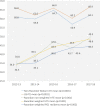Measuring change in knowledge acquisition of Rwandan residents: using the American Board of Pediatrics International In-Training Examination (I-ITE) as an independent tool to monitor individual and departmental improvements during the Human Resources for Health program: an observational study
- PMID: 31208418
- PMCID: PMC6580544
- DOI: 10.1186/s12909-019-1617-8
Measuring change in knowledge acquisition of Rwandan residents: using the American Board of Pediatrics International In-Training Examination (I-ITE) as an independent tool to monitor individual and departmental improvements during the Human Resources for Health program: an observational study
Abstract
Background: Rwanda is the only African country to use the pediatric International In-Training Examination (I-ITE). The objectives of this study were to use the scores from the I-ITE to outline the baseline level of knowledge of Rwandan residents entering the pediatric residency and the trends in knowledge acquisition from 2012 to 2018, during the Human Resources for Health (HRH) Program, an education partnership between the Rwanda Ministry of Health and a consortium of US universities.
Methods: A retrospective descriptive analysis of the I-ITE exam scores, taken by all Rwandan pediatric residents for five of the six academic years of the study period. Individual resident scores were weighted using the non-Rwandan I-ITE sites to minimise confounding from annual variations in exam difficulty. Statistical analysis included descriptives with ANOVA to compare variation in annual mean scores.
Results: Eighty-four residents took 213 I-ITE exam sittings over the five exam cycles. The mean weighted I-ITE score of all residents increased from 34% in 2013 to 49% (p < 0.001) in 2018. The 32-point gap between the mean US-ITE and Rwandan I-ITE score in 2012-2013 was reduced to a 16-point gap in 2017-2018. First year resident (PG1) scores, which likely reflect the knowledge level of undergraduate medical students entering the residency program, increased from 34.8 to 44.3% (p = 0.002) between 2013 and 2018.
Conclusions: The I-ITE is an independent, robust tool, measuring both learners and the institutional factors supporting residents. This is the first study to demonstrate that the I-ITE can be used to monitor resident knowledge acquisition in resource-limited settings, where assessment of resident knowledge can be a major challenge facing the academic medicine community. The significant increase in I-ITE scores between 2012 and 18 reflects the substantial curricular reorganisation accomplished through collaboration between Rwandan and US embedded faculty and supports the theory that programs such as HRH are highly effective at improving the quality of residency programs and undergraduate medical education.
Keywords: Education, medical; Formative feedback; Global Health; In-training examination; Internship and residency; Rwanda.
Conflict of interest statement
We declare no competing interest: One author (CO) is an unpaid member of the ABP Global Health taskforce. All authors are members of the HRH program and Rwandan academic staff of the University of Rwanda.
Figures


Similar articles
-
Experiences of the International In-Training Examination (I-ITE) by Rwandan pediatric residents - a survey-study describing candidate feedback.F1000Res. 2023 Jan 6;9:1448. doi: 10.12688/f1000research.27293.2. eCollection 2020. F1000Res. 2023. PMID: 39931078 Free PMC article.
-
Correlation of the National Board of Medical Examiners Emergency Medicine Advanced Clinical Examination Given in July to Intern American Board of Emergency Medicine in-training Examination Scores: A Predictor of Performance?West J Emerg Med. 2015 Nov;16(6):957-60. doi: 10.5811/westjem.2015.9.27303. Epub 2015 Nov 12. West J Emerg Med. 2015. PMID: 26594299 Free PMC article.
-
Do USMLE steps, and ITE score predict the American Board of Internal Medicine Certifying Exam results?BMC Med Educ. 2020 Mar 18;20(1):79. doi: 10.1186/s12909-020-1974-3. BMC Med Educ. 2020. PMID: 32183789 Free PMC article.
-
Performance on the Cardiovascular In-Training Examination in Relation to the ABIM Cardiovascular Disease Certification Examination.J Am Coll Cardiol. 2017 Jun 13;69(23):2862-2868. doi: 10.1016/j.jacc.2017.04.020. J Am Coll Cardiol. 2017. PMID: 28595703 Review.
-
A Systematic Review of the Relationship Between In-Training Examination Scores and Specialty Board Examination Scores.J Grad Med Educ. 2021 Feb;13(1):43-57. doi: 10.4300/JGME-D-20-00111.1. Epub 2020 Dec 29. J Grad Med Educ. 2021. PMID: 33680301 Free PMC article.
Cited by
-
Experiences of the International In-Training Examination (I-ITE) by Rwandan pediatric residents - a survey-study describing candidate feedback.F1000Res. 2023 Jan 6;9:1448. doi: 10.12688/f1000research.27293.2. eCollection 2020. F1000Res. 2023. PMID: 39931078 Free PMC article.
-
Peer-teaching at the University of Rwanda - a qualitative study based on self-determination theory.BMC Med Educ. 2020 Jul 20;20(1):230. doi: 10.1186/s12909-020-02142-0. BMC Med Educ. 2020. PMID: 32689991 Free PMC article.
References
-
- The American Board of Pediatrics . Am. Board. Pediatr. 2018. General pediatrics in-training examination.
-
- Du Y, Furter RT, Tan RJB, Althouse LA. In-training examinations: All about predictive validity and meaningful feedback. Paper presented at: American Educational Research Association Meeting 2016 Annual Conference; Washington, DC.
Publication types
MeSH terms
LinkOut - more resources
Full Text Sources
Medical
Miscellaneous

